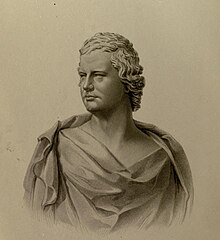W.E. Aytoun
| William Edmondstoune Aytoun | |
|---|---|

Engraving by J.C. Armytage from the bust of Aytoun by Scottish sculptor Patric Park
|
|
| Born |
21 June 1813 21 Abercromby Place, Edinburgh |
| Died | 4 August 1865 (aged 52) Blackhills, by Lhanbryde, Moray |
| Resting place | Dean Cemetery, Edinburgh |
| Occupation |
Writer to the Signet (1835) Advocate (1840) Professor of Rhetoric and Belles Lettres, Edinburgh University (1845-65) Sheriff, Orkney & Shetland (1852-65) |
| Nationality | Scottish |
| Citizenship | United Kingdom |
| Education | Edinburgh Academy (1824-8) |
| Alma mater | Edinburgh University |
| Notable works | Lays of The Scottish Cavaliers (1848) |
| Spouse | 1st Jane Emily Wilson (d. 1859) 2nd Fearnie Jemima Kinnear (m. 1863) (d. 1904) |
| Children | No issue |
| Relatives | Father-in-law: Professor John Wilson Brother-in-law: John Thomson Gordon |
William Edmondstoune Aytoun FRSE (21 June 1813 – 4 August 1865) was a Scottish poet, lawyer by training, and professor of rhetoric and belles lettres at the University of Edinburgh. He published poetry, translation, prose fiction, criticism and satire and was a lifelong contributor to the Edinburgh literary periodical Blackwoods Magazine. He was also a collector of Scottish ballads.
In the early 1850s, Professor Aytoun lent his name as a supporter of the fledgling National Association for the Vindication of Scottish Rights. His distinctive legacy as a teacher has led to him being called the 'first modern professor of English Literature'.
William Aytoun was born in the New Town of Edinburgh, the only son of Joan Keith (d. 1861) and Roger Aytoun (d. 1843), a writer to the signet. To his mother, a woman of culture, he owed his early fondness for literature (including ballad poetry), his political sympathies, and his admiration for the House of Stuart. He also counted poet Sir Robert Aytoun (d. 1638) among his relatives.
At the age of eleven years William was sent to the Edinburgh Academy, and subsequently entered the University of Edinburgh.
William Aytoun published his first book, Poland, Homer, and other Poems, in 1832, at the age of 19. This work expressed fervent concern for the cause of Poland.
In 1833 he journeyed to London where he spent a few months studying law, but decided in September of that year to travel on to Aschaffenburg where he studied German. While in Germany he made a blank verse translation of the first part of Goethe's Faust; but it was never published, forestalled by other translations. He remained in Germany until April 1834.
...
Wikipedia
